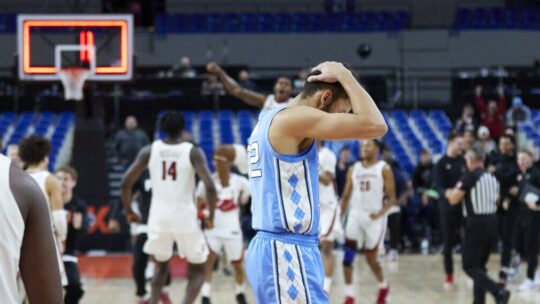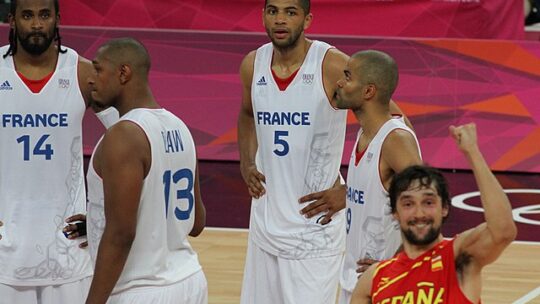5 Tips to Slump Busting in Basketball
Every athlete I have worked with, whether in basketball, baseball, tennis, or any other sport, will run into a performance slump at some point in their career. The slump will inevitably come, so you must be prepared for when it does.
It’s not the slump; however, that’s the biggest challenge, but what to do to get out of the slump that’s the most important. We never plan on a slump showing up – it just does. On the other hand, we never think of having a backup plan of what to do when it does. After all, who plans on failing?
Like in every sport, there can be a single instance slump, or the slump can carry on over a series of games or performances.
The longer the slump goes unresolved, the more challenging it can be to break it because the longer we reinforce the bad habits, the more difficult it is to break them. What started to be a single-game slump can quickly develop into a pattern of harmful physical and mental addictions.
In my opinion, most shooting slumps are mental. Confidence, trust, and belief in self are especially critical skills when shooting in basketball. Why are you shooting if you don’t believe the ball is going in every time you hit? Ask any good shooter, and they will tell you they expect the shot to go in.
It’s never a question of if but more of when it goes in. Any basketball player will tell you this even if they missed their last ten shots.
the following five mental game tips to Slump Busting in Basketball
will not make your slump disappear but will serve as a guide to help you look closely at what might be going on above your shoulders. Some beginner shooters make some mental mistakes during basketball games. you can overcome with the below steps.
Ask yourself, “Why am I in this slump?”
Check in with yourself, and if you have a journal, take time to put your thoughts down in your diary. What is it that’s holding you back? Is it your confidence? Is someone else getting in your head?
A sports psychologist or mental game coach is an excellent resource that brings the skills to help you get to the “What, When, and Why” behind the fear. Please keep it simple. There is no need to figure it out, but accepting or facing the fear is an excellent beginning.
Don’t second-guess
You may second guess because the coach is giving you mixed messages. One minute you have the green light, and the next, you don’t. One minute you’re doing fine, and the next minute you’re being pulled for turning the ball over or missing a shot.
If you second guess, you need to be more focused on the present, but either thinking about getting pulled from the game on a previous play or when you will be pulled out next.
To beat this, you have two choices: to play distracted by events out of your control or to play freely and in the moment without distractions. You are better off focusing on what you have in your control and forgetting everything else.
It’s almost as if you block out the coach and act without the fear of getting pulled. If you hesitate and think more about not making the mistakes, you’re more likely to make the mistakes.
Commit to yourself. You will play with a present tense state of mind, not worry about what might happen, and focus more on what you plan to make happen. Keep it very simple!
Embrace success
Recently, I worked with a very talented D-1 college point guard on a top 5 NCAA women’s basketball team. She had been in a shooting slump and had not been getting the results she was expected to reach. She started doubting herself and began to fear what was expected of her.
The fear became so intense that she often failed because she wasn’t sure what to do with her success once she got it. Everyone knew she had the talent. She was a fantastic player but needed to be more comfortable with the exposure.
To beat the fear, she started to welcome the prospect of success by planning what to do with success once it came. She started to imagine success, began to embrace it, and practiced how she would manage the exposure that came with winning.
Once she had a plan, she realized it wasn’t her shooting ability but her fear of what would happen when she did well.
Avoid overthinking
Thinking is for practice, reacting to what you know, and trust is for games. Often what happens is practice confidence does not transfer to game confidence. Thinking often comes into play if the ball player tries to be too perfect in game situations and therefore thinks more about mechanics rather than playing freely.
Thinking leads to analysis, and over-analysis leads to game paralysis. My tip for beating overthinking is to “try less” in games. Try less to do everything perfectly. Take 60% of your strengths and trust in them 100% of the time. This approach helps keep things simple.
Focus on the positive
Everyone talks to themselves. What you say to yourself is as important as how you say it. If you find yourself second-guessing, your subconscious may send negative messages to your conscious mind. To beat the negative news, you must counter with an alternative positive thought at a 5-1 ratio.
For every negative review, the counter-positive message must be repeated five times. Remember, you will be a more accurate shooter if you relax and are not distracted by negative news. If your self-talk is negative, you will be down on yourself.


